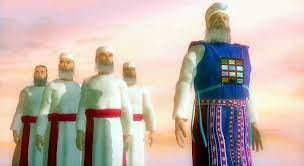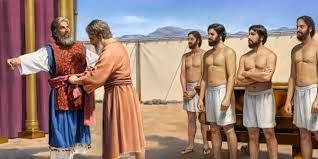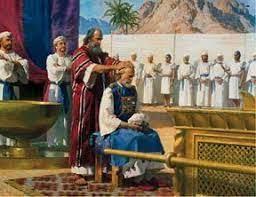The Ordination of Aaron and His Sons
8: 1-13
The ordination of Aaron and his sons DIG: Why was it important to assemble the whole nation to witness this ceremony? What part did Moshe play in it? For believers, what was significant about the first step of the priestly ordination being immersion? Moshe not only anointed the priests, but he also anointed the Tabernacle. What was the significance of this? When we follow the oil, how does it foreshadow the ministry of the Messiah?
REFLECT: The bull was the most expensive offering for the Israelites. What is your offering? Has God set you apart for any area of service? If so, what is that service? Why is it such a serious thing to be set apart for ministry? What might be some consequences of not doing ministry in the power of God’s Spirit and the authority of His Word? Why is it so important that ordination, or any call to service, be confirmed by other mature believers?
There were seven steps to the full ordination of the priests and the Tabernacle.

After the Tabernacle was completed, Isra’el was now ready to “come near” YHVH in His Tabernacle through the medium of the sacrifices. Only one thing was lacking: a confirmed priesthood to facilitate the sacrificial services. Each sacrifice served one of two purposes. It functioned either to confirm the priest (to set him apart and make him holy) or to purify the priest (ritual cleansing from Levitical uncleanness). The two concepts are not completely unrelated. To serve as a priest before ADONAI, the man needed to be both set apart as holy and in a state of ritual purity.93 Aaron and his sons were confirmed by a series of sacrifices and offerings, an anointing with oil (30:30-33), and the donning of the tunics, headbands and sashes. The entire ceremony is neatly summarized here. The end of this section begins to focus on Aaron’s descendents, not just his own sons, but in perpetuity: The priesthood was theirs by a lasting ordinance.
Dear Heavenly Father, Praise You for Your great love! Thank You for the joy of serving You and for the privilege of being priests who honor You. But you are a chosen people, a royal priesthood, a holy nation, a people for God’s own possession, so that you may proclaim the praises of the One who called you out of darkness into His marvelous light (Second Peter 2:9). What a privilege it is to offer back to You our love honoring Your Word and praising You. Through Yeshua then, let us continually offer up to God a sacrifice of praise – the fruit of lips giving thanks to His name (Hebrews 13:15). Praise You for You are Holy, Almighty, All-powerful, All-wise, Forgiving Savior, Loving Father! It is a joy to meditate on Your wonderful character! In Yeshua’s holy Name and power of His resurrection. Amen
ADONAI said to Moshe, “Take Aaron and his sons with him, the garments, the anointing oil (see Exodus 22-33 for its composition) the bull for the sin offering, the two rams and the basket of matzah (8:1-2). Together these elements form the essentials for the ordination of the priests. All of them carried an extremely high price in ancient Isra’el. They formed some of the most valuable commodities available. This reflects the importance of giving our best possessions to God (to see link click At – God’s Claim to the Best of Life).94
The community must be a witness (8:1-5): And assemble the entire (Hebrew: kol, meaning the all, in its entirety, including women and children) community at the entrance to the Tabernacle to witness the ordination of Aaron and his sons. The sages point out that it would have been a miracle for all Isra’el to fit at the entrance of the Tabernacle (8:3). Rabbi Eleazar said, “There were 600,000 men of Isra’el. This is one of the instances of the lesser containing the greater . . . Rabbi Yosef Chalaphta said, “The court was one hundred cubits long and fifty cubits wide, and yet did all Isra’el stand within? They stood crowded together, yet when they prostrated themselves, they all had plenty of room” (Leviticus Rabbah 10:9).95 However, the entire community was probably outside the gate of the Tabernacle (see the commentary on Exodus Ex – The Courtyard and Gate of the Tabernacle); inside the courtyard was restricted to the priesthood. Because these men had spiritual authority over the people, it was imperative that the entire community witness their ordination as priests in order to be convinced that they were actually called to be priests by God Himself. This is the point of all ordination services: it is God who calls people and confirms them to ministry. Both the one entering ministry and the congregation must acknowledge this from the outset if ministry is to function properly.96
Other momentous occasions in the history of the nation witnessed by the entire community included the invitation to bring gifts to build the Tabernacle (Exodus 35:1), the national census (Numbers 1:18), the ordination of the Levites (Numbers 8:9), and the water from the rock (Numbers 20:8).97 Moshe did as ADONAI ordered him, and the whole community was assembled at the entrance to the Tabernacle. Then Moses said to the community, “This is what ADONAI has ordered me to be done” (8:4-5). In other words, Moses did not pick Aaron as the high priest because he was his brother. He was merely confirming the one whom God had already chosen. Moses functioned as the mediator between YHVH and the priesthood during the ordination; but after the ordination, Aaron assumed the duties of the high priest. There were seven steps to the full ordination of the priests and the Tabernacle.

The first step was immersion (8:6): Moses brought Aaron and his sons and washed them in water. Most Jewish commentators assume that complete immersion is the intended meaning here, as was the custom in the Second Temple period on through to the present day. The immersion was a purification right, a ritual cleansing from Levitical uncleanness. In order to maintain the biblically required level of Levitical purity, a ritual immersion into a mikvah would be from then on, a daily routine for the priesthood. The Torah does not tell us about a mikvah in the Tabernacle outer court; we are only told that the priests were washed with water. Isra’el’s source of water at Mount Sinai was the brook that came down from the mountain (Deuteronomy 9:21).
For believers it is significant that the first ritual of the priestly ordination was immersion. Immersion into a mikvah was a sign of repentance and identification with Messiah’s death and resurrection is also the first step we undergo when we come to faith in the Master (see the commentary on Romans Bs – The Application of the Messianic Mikveh). It is the beginning of our service to Him as a royal priesthood (First Peter 2:9). We are immersed into Him just as the priests in their day were immersed into the water of the spiritual Rock that followed them, and that Rock was Messiah (First Corinthians 10:4).98
The second step was formal dressing of Aaron as the high priest (8:7-9): Following Aaron’s immersion, Moses dressed him in the clothing of the high priest. Aaron was dressed in his white linen undergarments, robe, ephod, the breastpiece that contained the Urim and the Thummim (see the commentary on Exodus Fw – The Clothing of the Levitical Priesthood), the turban on his head with the golden plate or sacred diadem with the name of God on it (see Exodus Gc – Make an Engraved Plate: Holy to the LORD). Upon his shoulders and over his heart were the names of the sons of Isra’el. Aaron’s sons were then dressed in tunics and sashes with headbands on them. They were confirmed for the ministry just as their father had been so honored, so that they would also serve as priests for all generations to come (Exodus 29:4-6, 40:12-16).
The third step was anointing with oil (8:10-13): Then Moses turned his attention to the ordination of the Tabernacle and its furnishings. With holy anointing oil in hand, he took the oil of ordination and sprinkled the Sanctuary and everything in it, thus, anointing everything to the priesthood. He sprinkled some on the altar seven times, anointing the bronze altar with all its utensils and the bronze basin to confirm them (Leviticus 8:10-11). Then he went out into the courtyard of the Tabernacle and sprinkled some of the oil on the bronze altar seven times, confirming it with all its utensils, and he also confirmed the bronze basin with its foot stand. This means that by putting a little oil on the objects, Moses set them apart for the priests to use only for the LORD’s service.
The sages note in the Midrash and Talmud that this oil was specially prepared by Moshe in the desert through a process that depended on a sequence of miracles. The resulting quantity of oil was sufficient to anoint Aaron, his sons, and the Tabernacle itself during the seven days of ordination. There was also enough to anoint every high priest in the following generations as well as some of the kings.

After the ordination of the Tabernacle, Moses anointed Aaron, the high priest. Moses took some of the oil and poured it on Aaron’s head, ordaining him and setting him apart for the office of high priest (8:12), symbolizing the empowerment of the Ruach. Psalm 133:2 apparently refers to this momentous occasion. It seems clear that the anointing of oil was a symbol of the Spirit of God coming upon the priests to empower them for service. We know, for example, that when Sha’ul and David were anointed, the Spirit came upon them to empower them for service (First Samuel Chapters 10-16). In addition, the Hebrew word for “anoint” is the word from which we get the word “Messiah.” The Messiah was the special Anointed One, empowered with the Ruach to be our eternal High Priest.99
Then Moses brought Aaron’s sons forward, put tunics on them, tied sashes around them and put headbands on them (see Exodus Gd – Make Tunics, Sashes and Headbands for Aaron’s Sons), ordaining them for the priesthood as Ha’Shem commanded (8:13). Unlike their father’s garments, the priestly garments of regular priests were simply white linen, likened to the garments given to the righteous in the book of Revelation (Rev 19:8). Everything was then in place to offer the ordination ceremony’s three main sacrifices: Aaron’s Purification Offering (see Ax), The Burnt Offering Ram (see Ay), and The Peace Offering Ram (see Az).
When we follow the oil in these verses it foreshadows the coming of the Messiah. First, in 8:10, Moshe sprinkled the Tabernacle and its furnishings. That foreshadowed Messiah coming out of the Tabernacle in heaven to the earth (Hebrews 8:5). Then in 8:11, the oil moves to the courtyard and the bronze altar of sacrifice. That foreshadowed Messiah as the Lamb of God who takes away the sin of the world (John 1:29). Finally, in 8:12, we see the oil being poured on the head of the high priest. That foreshadowed Yeshua as our great High Priest (see the commentary on Hebrews Ay – Messiah’s Qualifications as our Great High Priest).100



Leave A Comment